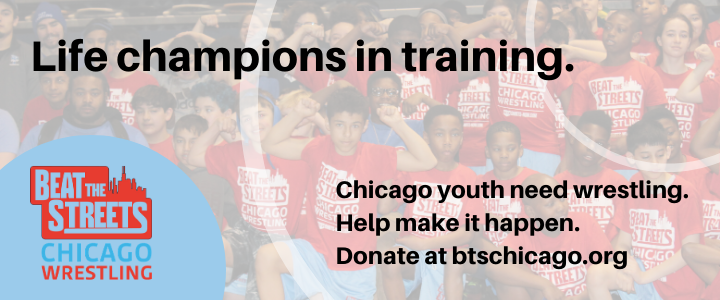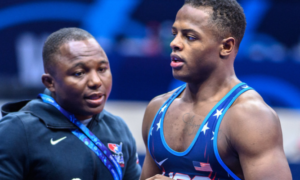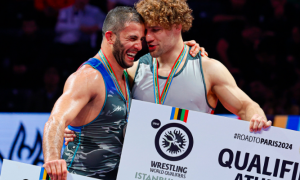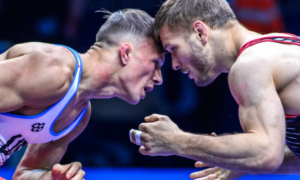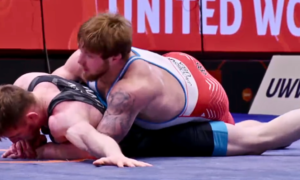As of this moment, Alan Vera (87 kg, NYAC, 5PM #4) is not yet cleared to compete in a United States selection process tournament.
What does this mean?
It means that if the 2020 US Nationals — which starts tomorrow morning from Coralville, Iowa and streams live on FLOWrestling — were to serve as a qualifying step for a potential World Team Trials next month, Vera would not be entering. The unique, pandemic-influenced circumstances are why the 29-year-old is allowed to compete. This version of the Nationals is a stand-alone event. There are no stakes involved. No money, no procedural implications. No nothing, really, other than a solid opportunity to suit up for a tournament everyone hopes will somehow keep Greco in the conversation a little bit longer, at least until the scary clown show that has been the calendar year of 2020 begins to regain even the barest tinge of normalcy.
Not eligible to represent Team USA at a World-level event just yet? Not a problem. Vera was still assigned the #1 seed over ’19 World Team member Joe Rau (TMWC/IRTC, world #6), who was pegged #2. Such is Vera’s reputation. He does own a win against Rau, a tech fall from the semis of the ’19 Schultz. But even without that victory, few would have voiced venomous displeasure with regard to the seeding order.
Vera, who defected from Cuba to the US in ’16, is indeed an American competitor nowadays. He first became permitted to don the stars and stripes in United World Wrestling-sanctioned tournaments some 19 months ago. In short order, he won the aforementioned Schultz, placed third in the Ukrainian International Tournament, and picked up gold at the Bill Farrell Memorial last November. Prior to all that have been other successes, mostly amassed in Cuba, where he was consistently stymied by that nation’s program when it came time to choose teams for annual World Championships. Not every country’s selection process operates with the same degree of transparency.
If you are to consider Vera an actual living, breathing US athlete — despite the fact that he is still waiting for his passport to become approved, which is an eventuality — then there is no choice but to recognize that he is the most technically-polished combatant in his weight class. His is the cleanest lift; his defense is the most fundamentally-sound and consistent.
Moreover, 87 kilograms, one of America’s roughest divisions, is not only home to Rau, but also to three-time World Team member Patrick Martinez (NYAC/Spartan RTC, 5PM #2) and Jon Anderson (Army/WCAP, 5PM #3) — who holds the distinction of being the only active US wrestler to have defeated Vera, a feat Anderson accomplished en-route to Pan-Am Games gold in ’15. Vera has downed Anderson, too, however, and every other US athlete he has come across recently. Most of the time, these triumphs were steamrolls.
All of these items, aside from Vera’s seed, are in the past tense. The future is decidedly more interesting and important. Most figure that Vera and Rau will bang heads Friday evening. That might be fun. But it’s October, not April. Just keeping up with Vera’s status has offered enough curiosity with which to occupy one’s mind. How he himself has managed to navigate all of this turbulence only adds to the texture of the story.
5PM Interview with Alan Vera
5PM: For months and months now when speaking with coaches, it has been, What’s the deal with Vera? What’s the deal with Vera? When he is going to be cleared? Then I heard in July that it was starting to look soon, and then it was supposed to be October. This has been a lot to deal with I imagine, especially with the Trials and all that.
Alan Vera: I’ve been thinking about it, too. Let me tell you about it, so you are going to have to take a seat and listen (laughs). Last March, I had an appointment for my interview. We are talking about March 10th. Well, March 11th was supposed to be the Last Chance Olympic Trials Qualifier. I said, Okay, everything is good. But this was the beginning of COVID-19, and they canceled my appointment. When I went to check it out, they were like, Oh, sorry, we canceled your appointment. We’ll let you know when we can reschedule. At the same time, USA Wrestling postponed all of their tournaments and everything shut down. I said, Okay, no problem. Then it was going to be in August and my appointment was canceled again.
5PM: If you could have been cleared for March and Last Chance, I suppose that would have been fine. But that aside, did the postponement help you or hurt you?
AV: Some people have said that it helped me, but it has still been frustrating. Remember, we are talking about last March with the appointment one day before the Last Chance Qualifier. Then in April, it would have been the Olympic Trials. I have people saying ‘yes’ and ‘no’, but why? I have more time (to prepare), yes; but in my mind, it feels a little bad. Because, it’s like, Okay, you have eight months. Then it’s seven months, and right now I have just six months. So I could say either ‘yes’ or ‘no’. It depends on which side you see.
5PM: Right now, who are your everyday training partners, especially since Jake Fisher and Jon Anderson moved back to Colorado?
AV: Hmmmm. My training partner? It’s a Suples dummy.
5PM: What do you mean? Like, seriously?
AV: Yeah, yes. I’m telling the truth.
5PM: So you don’t have a single Greco training partner in Hoboken?
AV: No, this is the reason I’ve been traveling every month — Florida, Minnesota, Colorado, Connecticut with Jake Fisher. Yeah. And the last three weeks, I am training once or twice a week with the Dominican guy who has been on their national team for several years. He is living in New Jersey. He said, Yeah, I can come and train with you a little bit, it all depends on my job. I said, Okay, I really appreciate that.
But yes, my best training partner everyday is a Su-ples du-mmy.
5PM: Well, that’s the problem with New Jersey, not a lot of Greco partners.
Alan Vera: Yeah, but I always knew that. Your happiness is never complete. But I have a really nice facility to train at in Hoboken. They train the Colombia guys and the NYRTC (New York Regional Training Center) guys are training freestyle. It is a really nice facility, really close to my house. I have a really good life with my wife, but I just don’t have any Greco partners. The reason is because Orry Elor moved last year. We were training a lot, every single day. It was probably my best situation.
5PM: Other than having gone back-and-forth in a couple of matches with Jon Anderson, you have beaten most of the top guys in the US in your weight class. Most of the time, those wins have been very dominant. Do you think 87 is better now than it was in ’16/’17 when you first came over here?
AV: To be honest, no. I’ll tell you why. In 2016-’17, you had basically the same guys who are competing now, except for Joe Rau because he was competing at 98. But you have to add one guy who was dominant for so many years, which was Jordan Holm. Jordan had tough matches with Jon Anderson. For me, I think there was more competition. Right now, yeah, there are young guys. There are more athletes in the weight class. But I focus more on quality, not quantity. You have to know that Jon Anderson beat me in 2015 at the Pan-American Games. That’s why I feel back then there was a little more competition in the weight class.
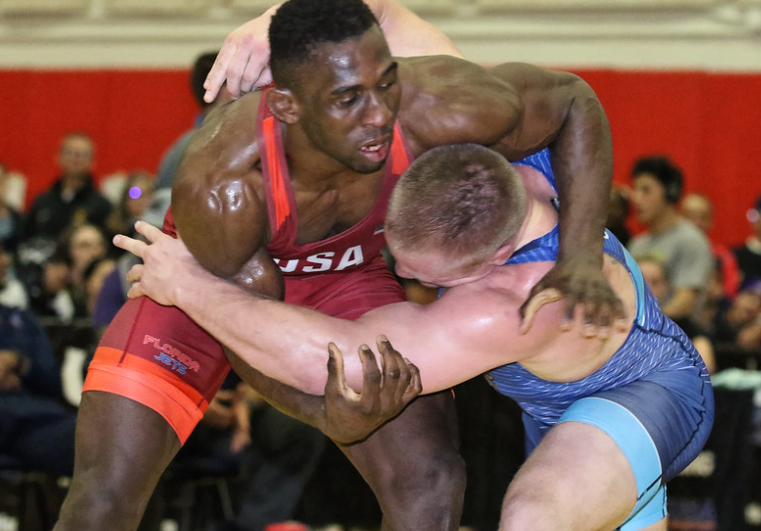
Vera (red) and Anderson slugged it out in a memorable final to decide 87-kg gold at the 2019 Dave Schultz Memorial. Anderson was down big before storming back in the second period, but Vera wound up closing the door just prior to the final whistle. Vera later added a bronze from Ukraine and a gold from New York to close out the season. (Photo: John Sachs)
5PM: People have looked at you as the #1 guy in the country — even though you are not yet officially a Team USA athlete. Last year, people were saying that if you were eligible for the Olympic Trials, you would have been the favorite. My question is, if you know that people feel this way and have been waiting for you to get cleared, does that put pressure on you?
AV: There always has to be pressure. Why? The pressure is good for me, and for everyone else, I think. Because, if you feel pressure, it means you want to do the right things. If you don’t care, you don’t have the pressure.
But yeah, so many people picked me as the favorite because they see my career from before, they saw how I wrestled against US guys, and they know that I am competitive. But — I feel good when I have someone pick me as the favorite because then I know that they trust me. And I like that. You play by this number, you go by the high-percentage winner, but at this point no one really knows.
5PM: When people think of you as a favorite, it’s not just because of your career in Cuba or your record, it is because of what they see when you wrestle. At 87, you have a side lift that is very explosive and seamless. You are effective from that position and pick up guys rather easily, almost in one motion sometimes.
AV: Actually, someone told me the same thing before and I have this explanation: you see me lift the guys and I make them look like they are really light; but that’s only what you see in matches. You also have to see how many side lifts I’ve done in training. It’s easy, but I’ve had to work a lot on my side lift.
5PM: I know this isn’t a Trials qualifier, or a Trials, but for this US Nationals do you have any extra nerves? Or, extra motivation, even?
AV: I like it. It’s so much more motivation. No pressure.
5PM: What happened to where you decided to enter this tournament?
AV: I didn’t know if they were going to have a US Nationals because of COVID-19, you know? When USA Wrestling decided to have the tournament, Matt Lindland called me and said, Alan, this could be happening. They had a meeting and they went by criteria. Then they said that I was allowed to compete. Why? Because it’s not a qualifier for the Olympic Trials, it’s not a qualifier for the Olympics. I have already been competing for the US since January of 2019, and they said I could compete.
I needed to think about it because I hadn’t been training. I know a lot of people expected me to win. He told me, Listen, if you can get in any of these training camps — like in Nebraska and Utah — to go along with what you do in Hoboken, it would be good for you because now you can get some matches since we don’t know when the next tournament is.
I was thinking about it, so I told Lindland, I’m going to listen to you. You have a lot of knowledge and experience in this sport, so yeah, include me. I just got a notice three weeks ago and they said ‘no problem’. I can go.
5PM: You believe that you should be cleared for the Olympic Trials soon, yes?
Alan Vera: I believe that should be coming soon, yes. But I have to wait for immigration so I can sign the papers. I have had two appointments that were canceled, first in March and then later in August.
5PM: What did these camps during the summer do for you? Were they good as far as the timing and since you didn’t have a lot going on? Have they provided the best training of the past year?
AV: Yeah, I can say that. Because, I have a lot of guys from the National Team, a lot of partners. You have to add something else, though. I have another guy, just so the Americans know, who is Frank Chamizo. He’s a freestyle guy.
5PM: Yeah, we all know who he is. He’s more famous in the US than any Greco athlete.
AV: (Laughs) Well, he was living in New Jersey during this whole coronavirus and we were training every single day, man. We would go with the Colombia coach. He’s from Cuba, so we had a good connection. He’s a freestyler but we made it work. We were outside doing pummeling, some exercises, and he pushed me a lot. I am very grateful for that guy. We were training every single day. It was better training for me than doing those training camps for the weeks in Nebraska and Utah.
5PM: Really?
AV: Yes sir.
5PM: Why?
AV: Because it is not just for a week. It is not just for five days. All of these training camps, I arrive on the first day, and the second day is difficult for me because I have to improve so many things, my body is feeling very sore. On the third and fourth days, I’m good; then on the fifth day, it’s over.
Another guy I have is Nestor Taffur. He is not in my weight class and he is freestyle, but the freestyle guys have a lot of energy and they bring a little pressure. We work a lot on pummeling. And we’re not talking about for just three or four days. We are talking about weeks. We’re talking training two times a day for weeks.
5PM: Do you focus significantly on your diet?
Alan Vera: Ohhh, this is a really good question. This is the one million dollar question (laughs). I will tell you the truth because I don’t want to lie to anyone: I don’t have a special diet. Just being honest. My wife helps me with my diet. She helps me a lot with what I should eat to get in better shape, for better training.
On the other side to that, some people say that it is genetics. It could be, but you have to add that I am training every single day for the last 15 years of my life. I never take two weeks rest or a vacation. And when I am training for tournaments, I do two sessions per day. So if you were to put it on a scale between genetics and my hard work, I want to say that it’s my hard work.
5PM: There are six months until the (Olympic) Trials. Are you going to change what you are doing as far as training partners, routine? Are you going to have to get out of Jersey City/Hoboken a little more often?
AV: Honestly, I want to change, and when I say “change”, I want to add a couple of things. For example, we were thinking about it and it’s everything before and after I compete. I want to train in Europe where there are training partners, since I don’t have any partners in Jersey. I want to change a little bit. I want to work on the mat a little more.
Becoming one of the Olympic Team members is not enough for me. I want to go to the Olympics, yes, very much. But I want to get my medal, and when I say “get my medal”, I want to get my gold medal. It’s easy to say, difficult to do, especially in this weight class. If you are at this level, you already know. We talk about the ’21 Olympics, everyone is training everyday. It’s really difficult. The Olympic champs don’t make it in four to six months. They are really careful about this. But I want to give it my best, so I have to change a couple of things.
5PM: The US is just starting to improve developmentally for this generation. It has taken a long time to get this far. And that is what it will take for the US to get back to where it once was. Would you like to be a part of how that happens?
AV: I have been thinking a lot about this. I’m 29 right now. I first got on the Cuban national team in 2008, and I know so many US Greco guys. We’re talking about Dremiel Byers, Lindland, so many guys. Justin Ruiz. Like you say, I don’t know what happened. I wasn’t living here. But we’re talking about the US Greco guys. They won the World Championships in 2007. That means you have to improve every single day in order to stay on top in this sport, and the US got only two medals between 2012 and 2016. That’s crazy. I don’t know what’s going on.
If you’re doing something but it’s not working, you have to change. And after I moved here in 2016, I got to see what is the trouble, what is the problem. High school, college. There is folkstyle, which is really good for freestyle. We can see the reason for that, the National Team in the US for freestyle is great, but it’s not so much for Greco. We have only one place for college, Northern Michigan. They have Greco guys there. But that’s just one place. We’re talking about thousands of wrestlers in the US. How many are there wrestling Greco in college? 30? 40? How many guys do we lose?
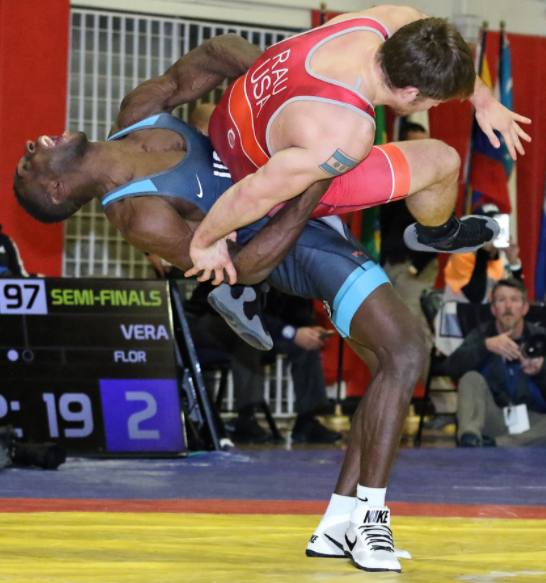
One of the more startling outcomes in a bout during the 2018-19 season came when Vera (blue) defeated then-eventual US World Team member (and popular 5PM Athlete Contributor) Joe Rau via tech fall early in the first period of the Dave Schultz semifinals. (Photo: John Sachs)
I don’t know about all of this money and what all of this costs, but I told Lindland two things. The first one is that the National Team has to do more training camps together. That means 40 to 50 guys at the same time. You need at least three guys per weight class, okay, so the maximum would be three. In Europe, for example, they have four or five training partners who are really good. The US, we should bring our guys together for one week every single month — because you need to see how these guys are doing.
The second one, I know is the money, but using that money for developing athletes. How long might that take? Two or three years? After three years, they can be really good. And then hopefully, there are more places like Northern Michigan. One is the west, one in the south, one in the Northeast. A minimum of two more, at least, because athletes and their parents think they have to wrestle folkstyle for an education. It would be so much better if you could say, My guys are getting an education and wrestling Greco at the same time.
So, the first thing I see is that we don’t have the National Team together full-time like they do in other countries; and the second one is opening one or two more, at minimum, university programs where they can train Greco-Roman full-time. This is my opinion.
5PM: Northern Michigan is doing well, it will be doing even better again shortly and they have 36 athletes. It’s not easy for a place in the US to just up and get that many athletes together in one program.
AV: I will go back to what I told you about my weight class. I like to focus on quality, not quantity.
5PM: Right, but you need the clubs, because clubs mean participation, and participation means numbers. And since Greco isn’t going to become widespread in the schools anytime soon, you need the sport to permeate through the club level. You know what I’m saying?
AV: I know what you are feeling about this Greco situation, and I feel this, too. So many people, they are feeling bad about this Greco situation, they are feeling sad. But to get better, we have to tell the truth. Even if it hurts someone, we have to tell the truth. That doesn’t mean we want to kill one thing over another, but if we have to put our truth on the table. Hey, this is we’ve got, this is what we can do, and this is how we can do it. Then it is, Okay, if this isn’t working, we have to change. Give me an idea. Alan, give me an idea. So-and-so, give me an idea. This is how we can create better ideas and get a better product.
I’d say what I would like to do is become a coach. I think I can become a better coach than I am an athlete. I have this perception. Let’s see what happens when I retire. I want to open a gym, work like a coach, but just for Greco. Just for Greco, because in America we have to work on the right things. And it’s not about more work, it is better work.
5PM: Yeah, through about half of this thing you’ve sounded like you want to be a coach. Which I guess isn’t surprising since you are basically coaching yourself.
Alan Vera: Sometimes life puts you in situations that you have to make the best of. It is different when you have someone tell you what to do, and when you have to do it on your own.
This morning, Nestor and I were talking about the Nationals and he asked me, “Who will be in your corner?” I said, “I don’t want anyone to feel bad, but who’s working with me right now?” Nobody, right? So, the NYAC coach who will be there, or JD Robbins, who will be there… But I wrestle with Orry. I told Orry, If I am competing officially, I would like you to take a seat in my corner. Why? Because no one knows me better than him since he worked with me everyday. It is easy to sit in the corner and say, Alan, go! Do whatever you want to do. Push, push, push. Side lift! Yeah, he’s my guy! No, no, no, no, no. If you want to get the results, you have to work. You have to do the work. Really, really hard work.
Listen to “5PM40: Sam Hazewinkel and Jesse Porter” on Spreaker.
SUBSCRIBE TO THE FIVE POINT MOVE PODCAST
iTunes | Stitcher | Spreaker | Google Play Music




